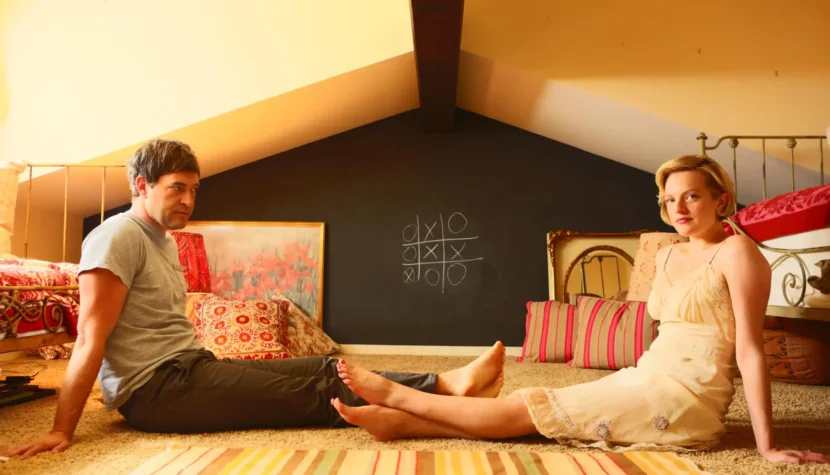THE ONE I LOVE. A Mix of Comedy and Science Fiction

The marital lack of understanding is the starting point for Charlie McDowell’s film “The One I Love”. A young couple, Sophie and Ethan, have no idea how to mend their relationship, leading them to a therapist. When their sessions yield no results, the therapist suggests a romantic weekend getaway in a cozy house in a charming location, far from everyone and everything. Reportedly, many couples have “recovered” through this retreat, but will this romantic weekend help Ethan and Sophie?
The well-known plot formula at the beginning—introducing a couple with issues in therapy—sets the stage for a romantic comedy blended with science fiction. With the trip to the romantic getaway, the personal struggles and relationship issues of the protagonists take on a fantastical twist (hinted at by the slightly eccentric therapist), while the director retains the film’s comedic tone.
The script essentially revolves around two actors (Mark Duplass and Elisabeth Moss), aside from the therapist character in the opening scenes (played by Ted Danson). Each actor has two roles, however, as the entire plot hinges on Ethan and Sophie encountering “better versions,” improved copies of their partners during the trip. For the couple, this is a chance to reconnect with the beloved person they once knew at the start of their relationship. Initially shocked by the situation, the characters soon begin to see the benefits of this unique arrangement.

Despite the absence of other characters and a somewhat isolated atmosphere with hints of schizophrenia, the film doesn’t lack action or feel bogged down by tedious, convoluted dialogue. The intimacy of the setting—most of the action takes place in two adjacent houses on a single property—is broken up by the characters’ constant movements between the houses, the contrasting behaviors of each version of the characters, and their discussions and arguments. Special effects, camera work, and editing give the impression that the house with the original characters and the house with their improved versions are two different realities, one real and the other idyllic. The copies of Sophie and Ethan look better, behave perfectly, and live in a prettier, cozier reality than that of the “real” pair. Special effects are also used to make the dual interactions between the original and idealized versions more convincing.
There is no doubt that Ethan and Sophie make a fantastic on-screen couple. Their banter feels effortless and natural. Both actors create two versions of their characters, playing subtle but important differences skillfully enough that watching them (in dual roles) as they navigate marital discussions and dilemmas is a pleasure for the viewer. Though their problems feel weighty to them, they bring a smile to the viewer’s face as Ethan’s rigidity, jealousy, and sarcasm clash with Sophie’s frustration and idealism. They then confront their copies: the sweet and charming Ethan and the gentle, agreeable Sophie. Despite Ethan being initially less likable—critical, scheming, jealous, and largely responsible for the conflict—it seems likely that most viewers will feel more sympathy for him than for Sophie.

The film’s most intriguing message, conveyed through the protagonists’ encounters with their improved doubles, is a commentary on the longing for an unchanging idealized vision of one’s partner, often felt during the early stages of romantic infatuation. With time, and after the “rose-colored glasses” come off, the characters no longer see each other as flawless, becoming frustrated and struggling to understand one another. However, Sophie and Ethan get a chance to experience their dream versions of each other for a fleeting moment, a moment they both—especially Sophie—long for. These scenes are the film’s strongest. As the plot twists, with all four characters meeting and what unfolds thereafter, it may not bring the same satisfaction as the first half of the movie. Still, overall, the script’s creativity, the dialogue, and the acting define McDowell’s film. The filmmakers put effort into deceiving and surprising the viewer toward the end, giving another reason to leave the theater feeling satisfied.

